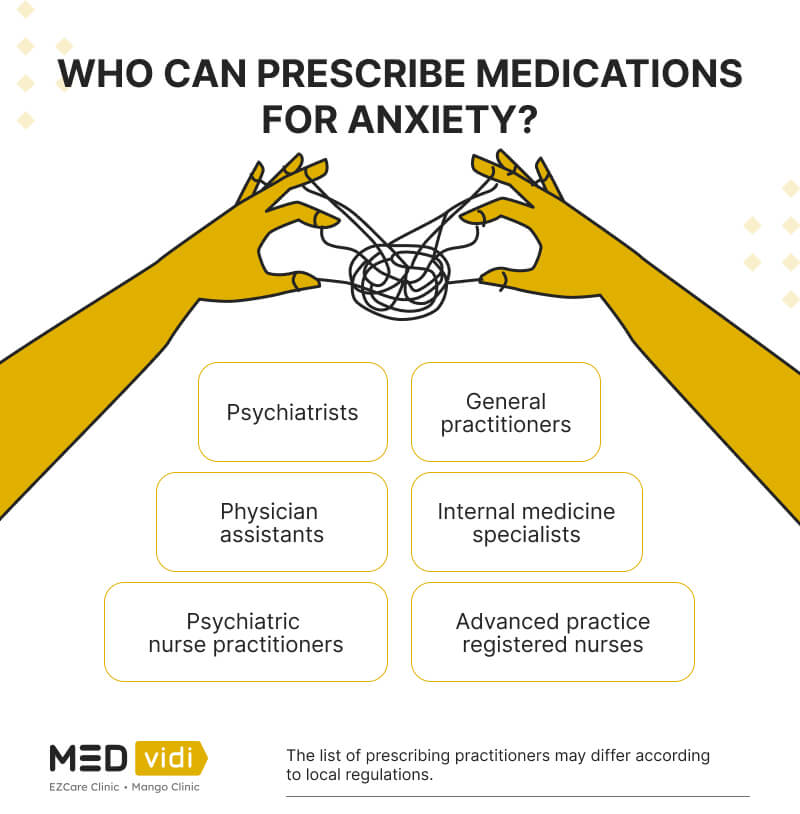Although there are many options for anxiety management, from psychotherapy to support groups to relaxation techniques, medications are still frequently used. Pharmacological treatment may be needed in severe cases of anxiety or when other interventions are ineffective.
This article explains when medication can be prescribed and who to talk to about anxiety. Read on to learn more about the types of healthcare professionals who can provide you with a prescription when deemed necessary.
Untreated anxiety can become chronic. See a healthcare professional to know how to manage your symptoms.
Who Can Prescribe Anxiety Medication?
Depending on the laws and regulations in each state, various licensed healthcare professionals can prescribe anxiety medications. These include:
- Psychiatrists — medical doctors who specialize in mental health. They are trained to diagnose and treat mental health conditions, including anxiety disorders. They can prescribe medications and provide psychotherapy.
- Medical doctors, family physicians, nurse practitioners, physician assistants, and internal medicine specialists can treat various medical conditions. They can prescribe anti-anxiety medication and refer patients to psychiatrists if the disorder is severe.
- Psychiatric nurse practitioners (PNPs) and advanced practice registered nurses (APRNs) can provide psychiatric treatment. They can diagnose and treat different mental health problems and prescribe medicines for anxiety.
Can Online Medical Providers Prescribe Anxiety Medications?
In the United States, healthcare professionals can legally prescribe medications online, depending on the state’s regulations and laws. The decision to prescribe medicine for anxiety is based on a careful assessment of present symptoms and general medical history. In addition, a healthcare provider should be informed about any medications a patient is taking to avoid interactions.
Healthcare professionals at MEDvidi can prescribe medication for anxiety online.
Qualified Healthcare Professionals Who Cannot Prescribe Medication for Anxiety
Psychiatrists can prescribe medicines for anxiety and also provide talk therapy as part of a comprehensive treatment plan. However, there are also qualified healthcare professionals who cannot prescribe medicines but can offer psychotherapy sessions. These include psychologists, licensed professional counselors (LPCs), and licensed clinical social workers (LCSWs). In the case the most effective treatment for you involves both medications and talk therapy, you have to see a prescriber in addition to a psychologist or a counselor.
How to Choose a Mental Health Professional?
You might not know if you need medication for anxiety before an appointment because the treatment plan is determined based on a detailed assessment. If your symptoms are severe and you believe you might need a prescription medication, then psychiatrists, primary care physicians (medical doctor, family physician, etc.), or psychiatric nurse practitioners (PNP) can help. Physician assistants, internal medicine specialists, and advanced practice registered nurses (APRNs) can provide prescriptions too. While psychologists and counselors cannot prescribe medications, they can diagnose the anxiety disorder and guide you on the next steps as well as refer you to another medical professional if necessary.
These are some general recommendations to assist you in finding an online platform and a healthcare provider if you are considering consulting with one for anxiety treatment:
- Look for reputable healthcare platforms where healthcare professionals are licensed to provide mental health services in your location.
- Look for information about the platform’s policies on patient privacy and data security.
- Evaluate the user experience and treatment approach by reading reviews.
- When choosing a provider, pay attention to the scope of disorders they specialize in, their education, and other details of their professional background.
When Are Medications Prescribed for Anxiety Disorders?
Prescription medications are usually prescribed to patients with chronic or severe symptoms of anxiety. It can also be a treatment of choice when a person doesn’t respond to psychotherapy and other interventions. Sometimes, medications do not replace therapy and self-help techniques but are used alongside. Note that the most suitable medicine and overall treatment strategy for anxiety is chosen by a medical expert, depending on the symptoms and medical history.
What Do Doctors Prescribe for Anxiety?
There are different types of anxiety medications and many options within each of them. The choice of the most suitable one and dosage depends on the type of anxiety disorder, current symptoms, medical history, and other circumstances. The following is the list of commonly prescribed anxiety medications.
Medicine | Mechanism of action |
Benzodiazepines | |
Antidepressants | Antidepressants can be prescribed for long-term anxiety treatment. These include selective serotonin reuptake inhibitors (SSRIs) and serotonin-norepinephrine reuptake inhibitors (SNRIs). This type of medication works by increasing the levels of serotonin and norepinephrine in the brain, which help regulate mood and reduce the symptoms of anxiety. Examples include Prozac (fluoxetine), Zoloft (sertraline), Lexapro (escitalopram), and Cymbalta (duloxetine). |
Buspar | |
Propranolol | Propranolol is a |
Click the button below to get prescription anxiety meds tailored to your needs.

How to Tell a Doctor You Have Anxiety?
When speaking with a healthcare provider, it’s important to be honest and open about your symptoms and worries. To prepare for an appointment, you can list the symptoms you’ve been dealing with, such as increased worry, agitation, or trouble sleeping, so as not to forget important details. Also, share any relevant information about the duration and severity of your anxiety symptoms. It will help make an accurate diagnosis and choose an appropriate treatment strategy.
Questions to Ask a Medical Provider About an Anxiety Disorder
An informed conversation can help you better understand your situation, explore treatment choices, and learn more about managing your symptoms effectively. To learn more about that, you may ask your healthcare provider the following questions about anxiety:
- What are the symptoms and causes of anxiety? How can I differentiate between anxiety and other conditions?
- What are the different types of anxiety disorders, and which one I might have based on these symptoms?
- What are the available treatment options for anxiety? Which treatment approach can be suitable for me?
- Is pharmacological treatment necessary in my situation? What kinds of anti-anxiety medications can help me and what are the guidelines for taking them if prescribed?
- What are the typical adverse effects of these medications? Are there any potentially harmful side effects of anxiety meds I must know? What should I do if side effects occur?
- Should I avoid any other medications or foods while taking anxiety medications?
- How soon might I expect to see progress?
- What should I do if the medication doesn’t seem to be helping me?
- What other actions can I take to control my anxiety?
In Conclusion: When to See a Doctor for Anxiety?
Consulting mental health professionals is recommended if the symptoms of anxiety are severe, cause distress, or interfere with your everyday activities. Prolonged symptoms may also indicate the need for a consultation, especially if you experience anxiety for several weeks or months, or if it is affecting your career, relationships, or general well-being.
At MEDvidi, we understand the importance of personalized mental health care. Our team comprises skilled healthcare practitioners with experience in identifying and treating anxiety disorders. Book an appointment today to learn more about suitable medications and self-help strategies.
Frequently Asked Questions
What is the best medical provider to see for anxiety?
It is generally recommended to see a psychiatrist or psychologist to treat anxiety disorders. However, other medical practitioners are skilled in identifying and treating anxiety too. These include general practitioners (GP), primary care doctors, and others.
Can a general medical provider treat an anxiety disorder?
A general doctor also called general practitioner (GP) or primary care physician (PCP) can treat anxiety, especially in milder cases, or as an initial point of contact, as well as an advanced practice provider such as a nurse practitioner (NP) or physician assistant (PA). Basic assessments, counseling, and medicine prescriptions can all be provided by general practitioners. They might also suggest that you see a mental health professional for additional assessment and therapy.
What do medical providers do for severe anxiety?
The course of treatment for severe anxiety may involve a combination of approaches, such as medications and therapy. Cognitive-behavioral therapy (CBT) aids in altering negative thought patterns and anxiety-related behaviors. Selective serotonin reuptake inhibitors (SSRIs), benzodiazepines, and other anti-anxiety medicines may also be recommended to help manage the symptoms. There may also be recommendations for lifestyle modifications, such as stress reduction approaches and other self-help practices.
Can therapists prescribe anxiety medication?
It is exceptional for psychologists and licensed counselors to be able to write medication prescriptions. Only trained medical personnel, such as psychiatrists, family doctors, advanced practice providers (NP or PA), etc. can prescribe anxiety medication. Talk therapy, counseling, and other non-pharmacological interventions are the main areas of concentration for therapists when treating mental health conditions, such as anxiety.
Where can I get a prescription for anxiety medication?
Licensed healthcare professionals in online and in-person clinics can prescribe medicines for anxiety. However, note that medication may or may not be prescribed depending on the symptoms assessment and other medical aspects.
Can I get diagnosed with anxiety online?
Yes, you can get a diagnosis for anxiety online through a video consultation. A healthcare provider will conduct a thorough evaluation and may ask to answer different questionnaires. Medical practitioners follow the same diagnostic guidelines for anxiety disorders when consulting patients online and in person.
Can anxiety be treated online?
Anxiety can be treated online through virtual therapy sessions or telehealth visits with prescribing professionals. Prescription management, counseling, support, and guidance on self-help techniques can be given during online appointments to help manage anxiety symptoms. However, severe cases may require in-person treatment.
Can online medical providers prescribe clonazepam?
Prescribing physicians have the authority to prescribe different types of medications for anxiety, including clonazepam, if regional laws allow them to do so. Note that the need for a prescription medication and the choice of the medicine depend on the clinician’s evaluation of your situation.
Can a neurologist prescribe anxiety medication?
Yes, a neurologist may occasionally recommend anxiety medication. Neurologists frequently treat patients with anxiety symptoms connected to or impacted by neurological factors, even though their primary area of expertise is the diagnosis and treatment of nervous system problems, such as brain disorders and neurological diseases.













